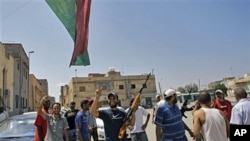The United States on Monday joined major human rights groups in urging Libyan rebel forces to refrain from revenge attacks on Moammar Gadhafi's supporters. The issue was discussed in a just-completed mission to Benghazi by the State Department’s chief Middle East diplomat.
Officials here are concerned that the jubilation in Tripoli might give way to revenge attacks on actual or perceived Gadhafi supporters, and they are urging the rebel movement to follow through on pledges to protect the rights of all those under their control.
Potential retribution was among the issues discussed by Assistant Secretary of State for Near Eastern Affairs Jeffrey Feltman on a visit to the rebel stronghold of Benghazi that ended on Sunday. Feltman said the “first step” in any post-Gadhafi era in Libya is to prevent a cycle of retribution.
State Department Spokesperson Victoria Nuland said U.S. officials are encouraged by new assurances on the subject from Transitional National Council, or TNC, chief Mustafa Abdul Jalil.
“He called for reconciliation. He called for a unitary Libya. So these are issues that the TNC has been very focused on," said Nuland. "We’ve also been cautiously optimistic over the situation that we’ve seen in the liberated parts of Tripoli so far. But this is certainly something that we are watching, that the TNC is working hard on because we do not want to see any more civilian life lost in Libya.”
Nuland said Libyan leader Moammar Gadhafi, his sons and other members of the regime with “blood on their hands” must face justice, and that the process of seeking accountability for crimes they might have committed needs to be “Libyan-led.”
Amnesty International and Human Rights Watch issued public appeals on Monday to the rebels and Gadhafi’s dwindling cadre of supporters to protect the rights of civilians as the conflict nears an end.
Amnesty International said these are “momentous, but extremely dangerous” days for the people of Libya, and that all forces must respect the right of civilians and ensure that the Tripoli fighting does not result in reprisals.
Omar al-Issawi, Middle East and North Africa Advocacy Director for Human Rights Watch, said it is a time for “cool heads, calm and respect for international human rights standards” in Libya. He said that among the many internally-displaced persons in Libya, those with dark complexions are at particular risk amid charges that the Gadhafi government used sub-Saharan Africans as mercenaries.
“Since the beginning of the conflict, there were accusations that Colonel Gadhafi was using African mercenaries to fight some of his battles for him. Therefore, we are concerned that there will be retribution or revenge meted out to people of dark skin on the simple suspicion that they are African mercenaries," said al-Issawi. "Now, whether they are dark-skinned Libyans or Africans living and working in Libya, we expect them to be afforded the full protection of Libyan law.”
Human Rights Watch said captured Libyan government figures should be treated humanely and that those facing charges from the International Criminal Court should be handed over for trial.
In late June, the ICC issued warrants for Moammar Gadhafi, his son Saif al-Islam Gadhafi, and intelligence chief Abdullah Sanussi on charges of crimes against humanity for their roles in attacks on demonstrators in several Libyan cities since February.
Nuland said the United States is not aware of Gadhafi’s whereabouts. But she said that if he is alive, the best thing he can do for Libya is to, in her words, “step down and end this.”
When asked whether the Libyan leader has been reaching out for some kind of deal, Nuland said the United States has not heard from him directly, but that it has received many feelers from people claiming to represent Gadhafi, including “more-desperate” inquiries in the last two days.
She said none of them were considered serious because none met the basic standard of the international community, which starts with Gadhafi’s willingness to yield power.
US, Human Rights Groups Urge No Retribution in Libya


















